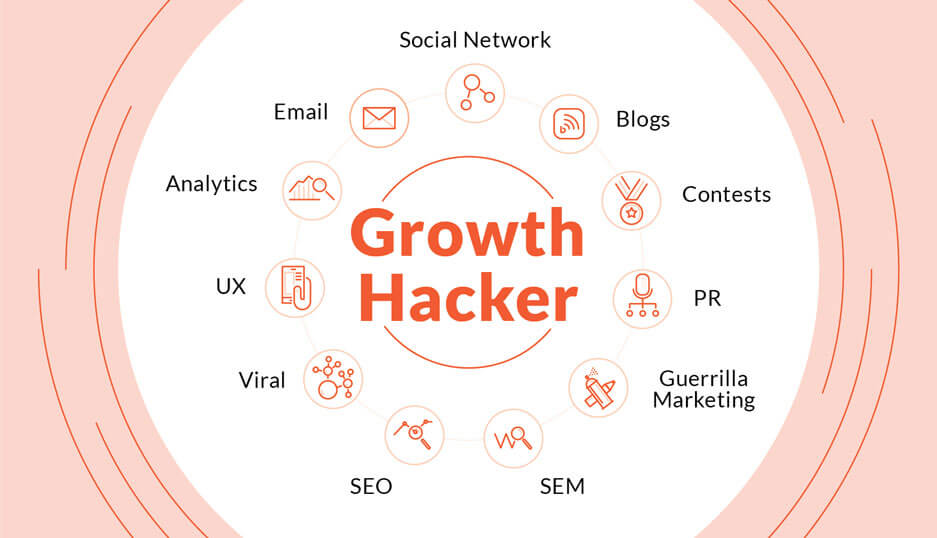The world of startups is being revolutionized by a unique phenomenon called Growth Hacking. It is a modern term that is much less understood than it is used. While Growth Hacking will involve everyone at every level of an industrial work scale (team worker, manager, engineer or managing director), it is especially useful for entrepreneurs and leaders who want to jump-start the growth of their startups.
What is Growth Hacking?

Growth hacking is a relatively new field in marketing that focuses on achieving massive growth in a short time period with a minimal budget. As such, it is a general term that encompasses all the strategies and methodologies that puts focus on achieving rapid growth while not draining you financially.
Who is a Growth Hacker?
A “Growth Hacker” literally is someone who comes up with unique and inventive ideas to achieve their goals. A Growth Hacker can be characterized by the same attributes with the exception that Growth Hackers are only focused on expediting the growth of the company that they work for.
Sean Ellis, the founder and ex-CEO of Qualaroo and current CEO of GrowthHackers is considered by many to be the first growth hacker. According to Sean, “A growth hacker is a person whose true north is growth”.
In accordance with his definition, a Growth Hacker should be curious and innovative with their approach. They should be observant and analytical of the market trends in order to come up with strategies related to the growth of the business. Additionally, they should be able to come up with cheap experiments to test their theories and be able to explain the results of those experiments to pick out the most dominant growth strategies.
Obviously, with different industries the precise job description of a growth hacker may change but the underlying principles upon which the mind of a growth hacker works will remain the same.
Why is Growth Hacking needed?
Small and newly developed companies can rarely afford to spend large sums of capital to discover new methods of accelerating their growth, nor can they conduct mega-scale marketing (billboards, television advertisements, etc.). Eventually, these new startups choose to risk and leverage innovative strategies to survive the initial periods. A startup can only grow or die. It cannot sustain itself in the air during those early months. With the advent of growth hacking, the probability that a company will survive those initial turbulent phases can increase vastly.
Is Growth Hacking only for Startups?

While Growth Hacking for startups may seem like an obvious use case, larger companies have also employed growth hacking strategies to foster their outreach and extend the boundaries of their products and services. PayPal, Dropbox, and Airbnb are popular examples of such large companies. All these companies used creative strategies to attract customers and retain them as happy users of their services. In doing so, they ensured the steady growth of their company. PayPal, for example, incentivized its users by paying them each time they referred a friend to their service. This did accrue additional costs, but in the long run, the strategy paid off and PayPal witnessed real growth. Similarly, Dropbox also rewarded its users by providing them additional space whenever the users and their friends signed up.
These strategies were a product of a growth hacking commute where growth hackers sat and focused on actions that could strictly be positive for the growth of the company.
Is growth hacking different from traditional marketing strategies?

There is a common misconception that growth hacking is vastly different from traditional marketing. Growth hacking is actually a subset of marketing. In fact, Sean, the godfather of growth hacking, was a marketer at Dropbox. But while growth hacking is a sub-field of marketing, it is extremely restrictive in the sense that it focuses on growth alone. In that sense, traditional marketers seldom become growth hackers (it is hard to leave old habits). However, growth hacking will often borrow strategies from traditional marketing strategies and use them in new innovative ways to drive growth. Digital marketing and growth hacking may seem like different entities, but they are intrinsically linked together in that a growth hacker might adopt a marketing strategy of his fellow digital marketer and apply it to foster the direct growth of the company.
Is Growth Hacking unethical?
The short answer is no.
Growth hacking is an intense process that requires hard work and analytical skills. While it is never expected of a growth hacker to employ unethical means to achieve growth, sometimes a growth hacker might come up with bizarre solutions that might sound illegal but in reality, they are just smart.
The case of Airbnb comes to mind. Airbnb leveraged a cross-listing technique and allowed users to post their listings on Craigslist (they found a loophole in the codebase of Craigslist). By doing so, they were able to access the much larger userbase of Craigslist and ended up increasing their outreach. This might sound unethical to some. But it is a pure example of growth hacking where a smart reverse-engineering strategy was used for Airbnb’s growth.
How can you become a growth hacker or use their methodologies to grow your business? We will discuss this in a coming post!

For the reason that the admin of this site is working, no uncertainty
very rapidly it will be famous, due to its quality contents.
I really got a lot of information from your site. I want to help you too.
I hope you can visit my blog and get some good information like me.부산오피